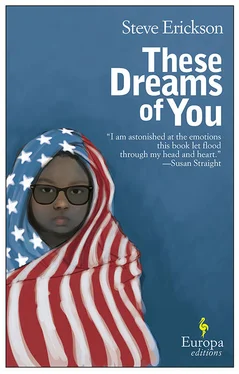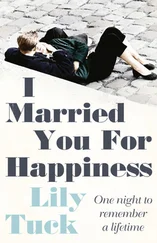The song is ravenous for memory, and Viv hears in it everything that’s happened to her and her family since that first time she came, the struggle of everything since Sheba came to live with them, the whispers between her and Zan in the night that somehow everything will be all right even as it becomes harder to understand how that can possibly be true. Lost here in these passageways Viv has a realization bordering on a small epiphany: It’s the memory of how quiet Sheba was those first nights lying on the hotel bed beside Viv wreathed by “Tezeta,” and how it wasn’t until Sheba got back home that her own small body began to broadcast its music, as though a secret word was spoken that turned her up.
Jasmine hears the song on returning to Ethiopia for the first time since the age that Sheba was on leaving it. This is during Assassination Summer, riots as much about grief as rage sweeping the Chicago park where, forty years later on Zan’s TV one November night, crowds greet the election of a new president whose only precedent is what forty years before was forsaken. Jasmine’s sojourn follows a brief reconnection with her father, a retired medical orderly — who never became a doctor — hobbling with arthritis, and her brother, an eternal thirty-one-year-old student wandering the landscape of aspirations looking for his.
While she’s angry at her father for abandoning her and her brother and mother, Jasmine senses this reconciliation is a fleeting final chance at something. The three take a trip to Addis together where at night she hears “Tezeta” wafting from the clubs and isn’t sure whether what she glimpses is a memory from when she was two or a dream posing as one; but hearing this song is the only time Jasmine feels like she’s home. In assassination’s wake she sometimes aches for the solace — a less secular word than comfort — of the mosque; on the flight to Ethiopia, she wonders if she’ll leave. Eight days later, with her brother she does, but her father does not, and she never sees him again.
Jasmine knows it should never have been about him , the small struck-down man. It should have been about what he stood for; she knows that. But she can’t separate the two nor, she finally reasons, should they be separated. Democrazy, as she calls it, isn’t about abstractions, it’s about the humanity behind abstractions, the candidate’s persona that becomes inextricable from accompanying convictions.
She doesn’t believe that she has the right to leave Los Angeles, the scene of the crime. She drifts back into a music business that’s on an altogether different level from when she was managing hardscrabble Andover bands in London trying to get a hit single; now everyone’s an Artist. No one makes singles but rather magna opera with librettos delivered in spectacular gatefolds, right up to the altogether new pretension of librettos disappearing and gatefolds going blank. Her role never has been about aesthetics. It’s about managing the lives that have gotten as extravagant as the product — bands with private planes, dressing rooms with liquor and drugs and candy of a designated color, naked girls of every color in closets wrapped in red bows. On the rare occasion when someone tries to coax her from music back to politics, she answers, “No one’s ever going to assassinate a songwriter, even in this country.”
She has an affair with a black session keyboardist who has a wife in Atlantic City. She breaks it off after eight months; to her surprise, since she never suspected such inclinations in herself, she has a longer relationship with a young white woman out of college named Kelly who designs album covers for artists that the public hasn’t heard of. The covers fill the walls of the little house on the edge of Hancock Park that the women move into together.
Though the break-up takes a couple months, the relationship ends after three and a half years when Jasmine wakes in the middle of the night realizing she wants a child. “We can adopt!” Kelly wails desperately; but Jasmine already feels her womb invaded by the future. Hating herself, pulling away from the house with Kelly sobbing in the rearview mirror, she drives and keeps driving all night, trying to escape the melody of “Tezeta” in her ears until she realizes that the song comes from the vapor within her. “Are you a ghost?” the future mother cries out loud to the daughter who haunts her before she’s conceived.
Jasmine has been working for the record company four years when she’s assigned its biggest client. “See what you can do with him,” says the executive across the desk from her, in an office overlooking Highland Avenue, “this calls for personal attention.”
“What do you mean personal attention?” Jasmine says suspiciously.
“At the rate he’s going, he’ll be dead within the year.”
“Drugs.”
“Kilos.”
“He’s a Nazi,” she says.
“Those,” sighs the executive, “were just silly things he said to an interviewer.”
“Sieg heil from the back of a car at Victoria Station?”
“He loves black music!” the executive exclaims, and Jasmine stares at him stonily. “You’ve got to learn not to take these things personally.”
“I once learned from someone,” says Jasmine, “to take everything personally.”
“Was he in music?”
“He ran for president. Does our rock and roll spaceman from Mars or Nuremberg or wherever it is this month still wear dresses?”
“That was one album jacket five years ago.” Jasmine tries to remember if Kelly designed it. “He’ll be back in town in the next couple days and has rented a house over off Doheny. Why don’t you drive out there? Talk to Anna, his personal-assistant/backup-singer/girlfriend.”
“So he does fancy girls then.”
“He’s always liked girls. Don’t tell anybody, at least not yet. Our marketing on him is just entering its heterosexual phase.”
“He’s in his Nazi phase now,” nods Jasmine.
In the driveway of the house, she stops the car aghast. The abode is Southern Californian Egyptian — white pyramid with gas jets at the top spouting fire, a flaming sarcophagus. When she rings the doorbell, the woman who answers coolly appraises Jasmine half a minute before letting her in.
“Why did they send you?” asks Anna, lit joint between her fingers as the two black women make their way down the hall. She considers her manners long and hard before offering it. “No, thanks,” says Jasmine. “I think they thought I might help.”
“I’m sure they did,” the other woman says, “but let me be fucking direct. His pasty white English ass likes the sisters. There was one before me and may be one after but it sure as shit isn’t going to be you.”
“That’s not what I’m here for.”
“Groovy, but wake up. That’s why they sent you.”
“The last thing they want is more drama. They’re worried about him.”
Anna softens a bit. “Can’t say he’s not worrisome.” She takes a chair and indicates the sofa across from her. “Coke,” she says, “amphetamines. Lots of coke. More coke than I’ve seen a single human being suck up. Problem is he still does function, still gets it done. I know that’s what they all say but in his case it happens to be so. Five albums in two years? And the last two sold best of all. It’d be better for him if they hadn’t. Course I know you folks just want to squeeze another out of him before it’s too late.”
“They don’t want to squeeze another,” says Jasmine, “they want to squeeze another five. If they cared only about another they’d be less worried about trying to save him and more worried about getting him into the studio every available moment while they have the chance.”
Читать дальше











